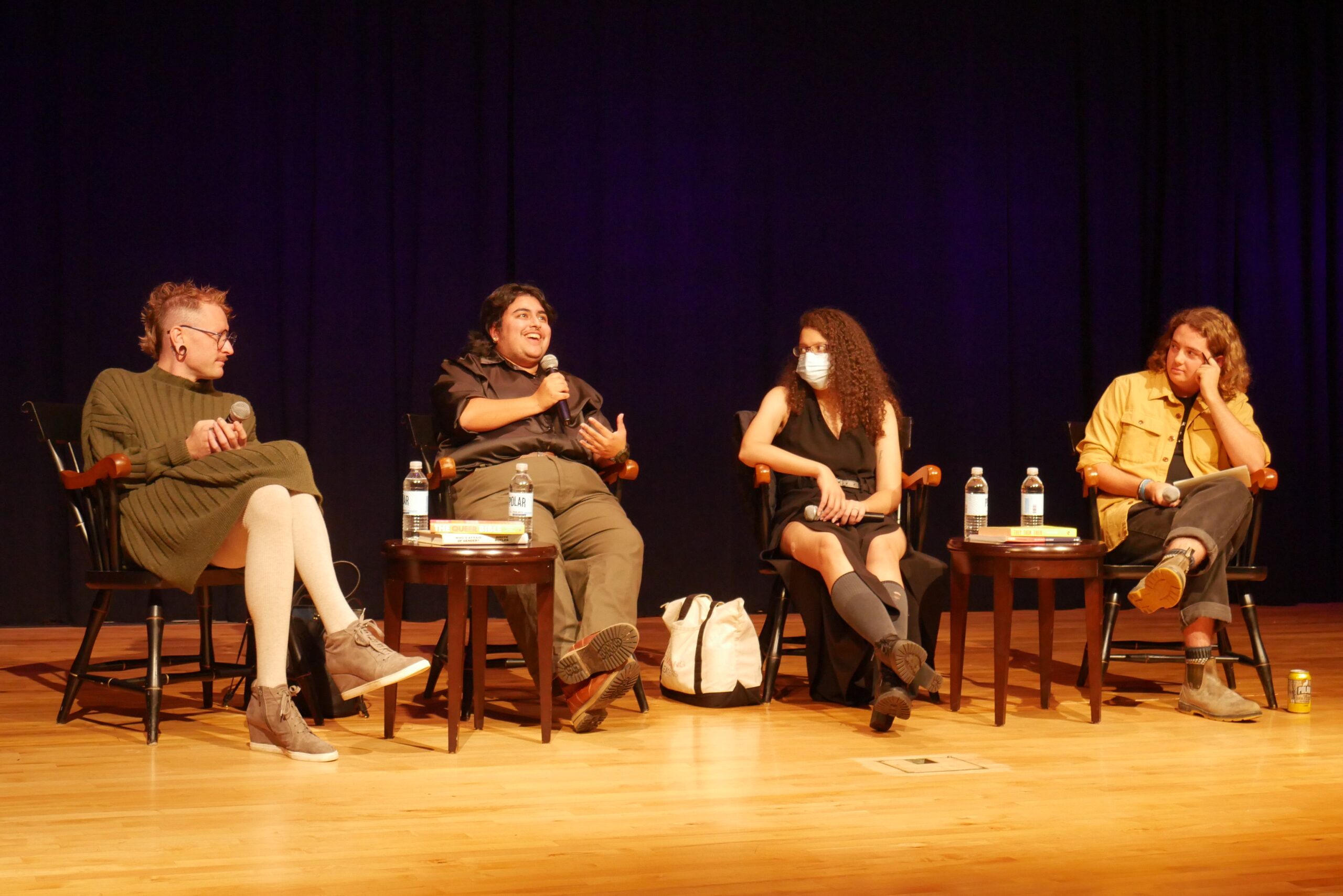SWAG hosts panel on transgender advocacy and community building
October 25, 2024
 Abigail Hebert
Abigail HebertArtistic expression, community building and queer joy were among the topics considered by a panel of three local transgender advocates in Kresge Auditorium on Monday night. Facilitated by Eli Bundy ’27, the discussion entitled “Voices for Trans Liberation: Stories of Resistance, Survival and Joy,” celebrated the amplification of transgender voices during LGBTQ+ history month.
The panel was made up of Bowdoin student Yusur Jasim ’25, poet Maya Williams and drag queen Gigi Gabor with the goal of reflecting a diverse range of voices in Maine’s transgender community. The Sexuality, Women and Gender Center (SWAG) coordinated the event as part of a larger series of programming this month celebrating “Outober.”
SWAG Director Natalie Turrin kicked off the evening by introducing the panelists and describing the significance of the event in the current political moment.
“We gather here in a time when the trans community faces tremendous backlash, rising moral panic and hostility, and in this moment of challenge, it’s crucial to elevate and honor the voices of those who are living their truths,” Turrin said. “Trans lives are rich, complex and resilient, and by listening to these voices, we not only foster understanding and empathy, but also affirm the humanity and dignity of every human.”
Panelists echoed Turrin in their discussion, stressing the importance of disseminating the diverse and rich history of the transgender community. Gabor, owner of the traveling drag show “Curbside Queens,” discussed her effort to promote the historical significance of drag in her work.
“So much of drag has taken us from a place that should not have been and tried to move us forward. Sometimes people have forgotten that when they’re doing drag over the years,” Gabor said. “So one of the big things that I’ve tried to do with my business … is to remind people that this vessel of art that we’re using is not just for entertainment but it’s also for change and for our rights.”
Throughout the evening, members of the panel discussed their personal experiences with navigating trans identity, emphasizing the power of intra-community support during difficult times.
“For me … the root of my queerness and my transness is gathering as a community. The spaces that we share and the experiences that we share have really been those moments [of joy], and so a lot of what I’ve been doing is creating those spaces for people,” Gabor said.
The conversation touched on intersectionality, as panelists considered how their support for the transgender community has overlapped with other forms of advocacy work. Williams talked about their experience working with incarcerated individuals in Maine and emphasized their concern about inequities in correctional institutions.
“So much more is compounded when it comes to incarcerated trans folks in Maine. So much is compounded when it comes to not having access to the documentation that they need, when it comes to gender-affirming names and gender markers,” Williams said. “There has been legislation in Maine when it comes to the improvement of the rights of incarcerated trans people, but at the same time, Maine needs to do better.”
When Bundy prompted panelists to offer advice for audience members exploring their gender identities, Gabor urged individuals to prioritize relationships with those who accept their gender expression.
“You don’t have to suffer with people that don’t respect you. And that doesn’t mean that you are in a place that you can walk out tomorrow,… but you don’t have to stay in a space that isn’t right,” Gigi said. “It’s not on the marginalized person to do the work for them. And that’s something I wish someone told me a long time ago.”
Dash Rumble ’27, who attended the event, expressed gratitude for the wisdom of the transgender adults on the panel.
“It’s nice to hear from trans elders, and it’s nice to hear stories from people who’ve continued their lives in the big wide world as trans people,” Rumble said. “I know it’s okay to be trans, but … to feel other people reinforcing that and reminding me it’s not on me to carry that burden was nice.”

Comments
Before submitting a comment, please review our comment policy. Some key points from the policy: